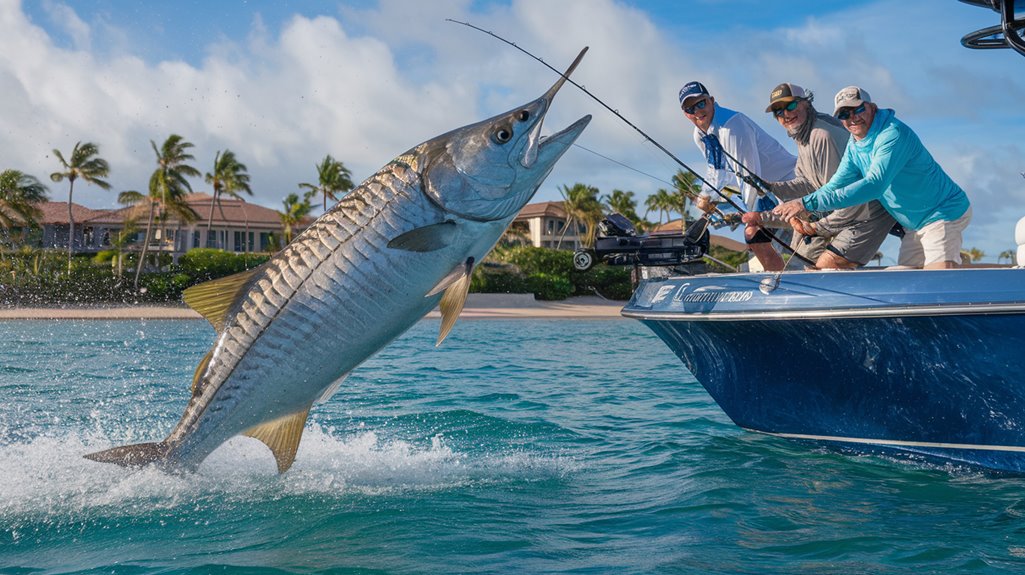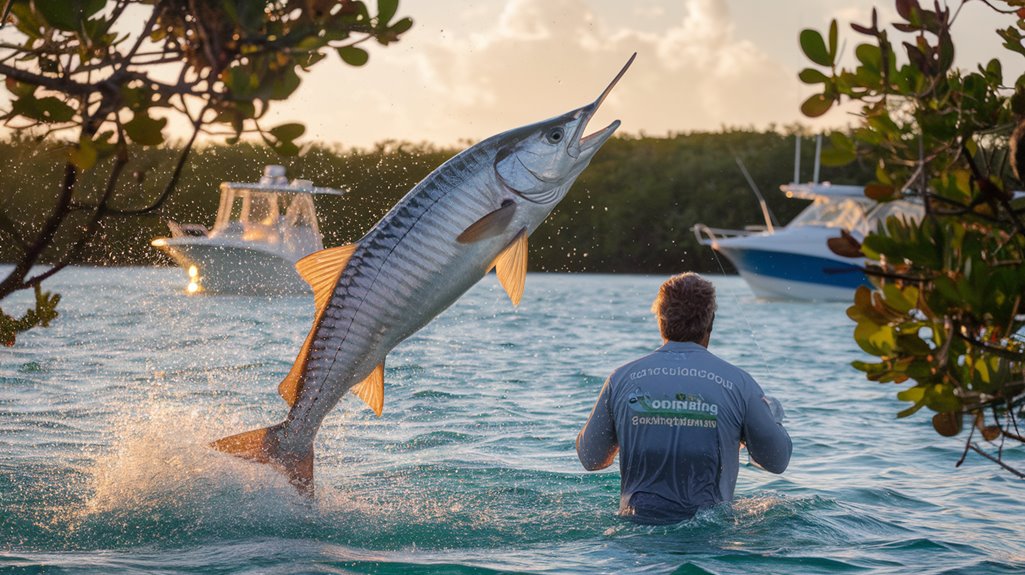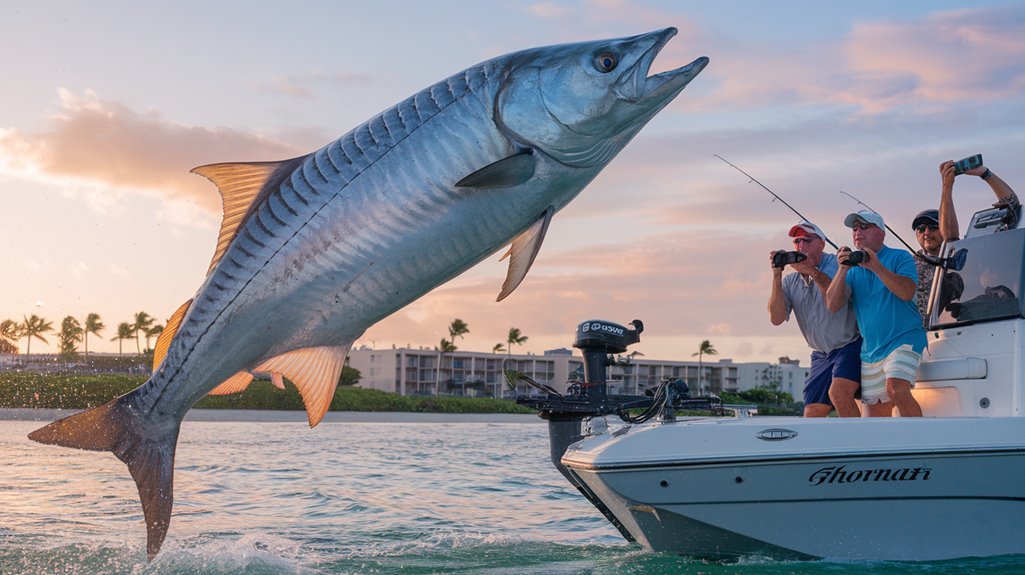You'll find that tarpon fishing tourism generates over $108 million annually in Florida's Gulf Coast region alone, according to recent economic impact studies. This revenue stream extends beyond charter fees to include lodging, dining, and retail purchases throughout coastal communities. While traditional fishing destinations have long relied on seasonal anglers, today's tarpon tourism market has evolved into a year-round industry fueled by social media exposure and advanced booking technologies. Understanding these shifts can help you capitalize on emerging opportunities in the sport fishing sector.
- Key Takeaways
- Historical Significance of Tarpon as a Game Fish
- Economic Impact on Coastal Communities
- Peak Season Tourism and Charter Services
- Global Recognition of Premier Fishing Destinations
- Conservation Efforts and Sustainable Tourism
- Accommodation and Amenity Development
- Cultural Heritage and Fishing Traditions
- Marketing Strategies for Fishing Tourism
- Professional Guide Services and Employment
- Tournament Events and Local Business Growth
- Modern Technology's Influence on Sport Fishing
- Frequently Asked Questions
- Conclusion
Key Takeaways
- Tarpon fishing generates $1.6 billion in annual recreational fishing revenue, driving substantial economic growth in coastal Florida communities.
- Peak season from April through July attracts tourists worldwide, maximizing charter bookings and local business revenues.
- Professional guide services and tournaments create employment opportunities while preserving traditional fishing knowledge and practices.
- Conservation efforts and sustainable tourism practices ensure long-term viability of tarpon fishing as a prime tourist attraction.
- Marketing strategies and technological advancements enhance the fishing experience while promoting sustainable tourism growth.
Historical Significance of Tarpon as a Game Fish
When wealthy Northern sportsmen discovered the abundance of tarpon in Boca Grande during the late 19th century, they sparked a transformative era in recreational fishing that would reshape the region's economic destiny. You can trace the historical significance of tarpon fishing to 1885, when the first documented catch put Boca Grande on the map as a premier fishing destination. The early 20th century saw this market expand rapidly, with competitive tournaments attracting high-end visitors and establishing a lucrative tourism sector. As fishing techniques evolved by mid-century, so did the economic impact of tarpon fishing. Today's conservation efforts guarantee you'll find a sustainable balance between tourism revenue and resource protection, maintaining tarpon's status as both a valuable game fish and an essential driver of regional tourism.
Economic Impact on Coastal Communities
You'll find that tarpon fishing creates substantial job opportunities in coastal communities, with charter captains, guides, and support staff forming a robust employment network. Your local charter service options range from half-day excursions to multi-day adventures, generating significant revenue streams for coastal economies through booking fees, equipment rentals, and associated services. The charter fishing industry's economic multiplier effect extends beyond direct revenue, as each fishing trip typically involves additional spending on lodging, dining, and retail purchases.
Job Creation Through Fishing
The economic ripple effect of tarpon fishing extends far beyond the waterfront, generating substantial employment opportunities throughout coastal communities. You'll find job creation spanning multiple sectors, from direct fishing-related positions to supporting service industries. In places like Boca Grande, tarpon fishing has catalyzed significant business growth, creating a robust job market.
Here's how tarpon fishing drives employment:
- Charter operations create positions for guides, captains, and support staff
- Tourism infrastructure demands hospitality workers and service providers
- Tackle shops and equipment retailers need sales and maintenance personnel
- Transportation services require drivers and logistics coordinators
The Florida Fish and Wildlife Conservation Commission's study confirming $1.6 billion in annual recreational fishing revenue underscores the industry's role in sustaining local economies and providing diverse employment opportunities.
Revenue From Charter Services
Charter service revenues represent a cornerstone of coastal economies, with destinations like Boca Grande experiencing multimillion-dollar annual tourism influxes from tarpon fishing alone. You'll find that tarpon fishing charters create a multiplier effect throughout local economies, benefiting hotels, restaurants, and retail establishments that serve visiting anglers.
The revenue from charter services extends beyond the direct booking fees. Tournament events drive significant economic activity, attracting both participants and spectators who spend money in coastal communities. Sustainable fishing practices guarantee these revenue streams remain viable long-term, protecting both the marine resource and the tourism industry it supports. By catering to various skill levels, charter operations maximize their market reach, enabling broader participation and increased revenue generation across the tourism sector.
Peak Season Tourism and Charter Services

During Florida's peak tarpon fishing season from April through July, tourism surges dramatically as thousands of anglers flock to premier destinations like Boca Grande and Homosassa. You'll find the fishing charters operating at maximum capacity, particularly during full moon periods when tarpon activity peaks. The economic impact ripples through local communities as visitors book accommodations and support related businesses.
Key tourism drivers during peak season:
- Professional guided charters offering customized experiences for all skill levels
- Prestigious fishing tournaments attracting competitors and spectators
- Full-service charter packages combining lodging and guided fishing
- Specialized fishing experiences targeting migrating tarpon schools
This concentrated period of tarpon fishing activity generates millions in tourism revenue, establishing Florida's west coast as a world-class sport fishing destination.
Global Recognition of Premier Fishing Destinations
Renowned worldwide for its exceptional tarpon fishing, Boca Grande leads Florida's premier destinations in generating substantial tourism revenue, with over $50 million annually from sport fishing activities alone. You'll find that fishing charters offer diverse experiences across the state's top locations, including Homosassa's record-breaking waters and Islamorada's scenic grounds. These destinations have earned global recognition as each area positions itself as a top destination for tarpon during the peak migration months of April through July. Conservation initiatives strengthen these locations' reputations while ensuring sustainable fishing practices. The combination of pristine waters, reliable seasonal migrations, and well-maintained ecosystems has established Florida's coastal communities as international benchmarks for world-class tarpon fishing destinations.
Conservation Efforts and Sustainable Tourism

As sustainable tourism gains momentum in coastal regions, conservation efforts have become the cornerstone of tarpon fishing's economic success. You'll find organizations like Bonefish & Tarpon Trust leading initiatives that protect tarpon populations while maximizing tourism revenue. These conservation-focused approaches have created a symbiotic relationship between environmental preservation and economic growth.
Key drivers of sustainable tarpon tourism:
- Catch and release practices that maintain healthy tarpon population levels
- Educational programs linking habitat preservation to tourism revenue
- Community partnerships that strengthen conservation initiatives
- Economic incentives that reward sustainable fishing practices
Accommodation and Amenity Development
The rapid expansion of tarpon fishing tourism has transformed coastal accommodations into a thriving $200+ million industry, with destinations like Boca Grande leading the market evolution. You'll find accommodations tailored to every angler's needs, from luxury resorts to eco-friendly lodges that emphasize conservation practices.
| Accommodation Type | Target Market | Average Daily Rate |
|---|---|---|
| Luxury Resorts | High-end anglers | $350-500 |
| Fishing Lodges | Tournament groups | $200-300 |
| Eco-Friendly Hotels | Conservation-minded | $175-250 |
| Vacation Rentals | Family groups | $150-275 |
| Charter Packages | Guided expeditions | $400-600 |
Custom fishing packages now dominate the market, combining guided excursions with specialized amenities. Local businesses have adapted, offering tournament-ready facilities and specialized services that cater to both casual and competitive anglers throughout the peak fishing season.
Cultural Heritage and Fishing Traditions
You'll discover centuries-old tarpon fishing methods still practiced today, passed down through generations from Indigenous tribes to modern anglers along the Gulf Coast. Local fishing communities maintain their cultural identity by sharing traditional knowledge, from bait selection techniques to understanding seasonal migration patterns that have proven successful for over 100 years. The region's rich fishing heritage lives on through storytelling at local tournaments and gatherings, where experienced anglers share tales of legendary catches and time-tested techniques that continue to attract tourism dollars to coastal communities.
Ancient Fishing Methods Preserved
Throughout history, indigenous cultures along the Gulf of Mexico and Atlantic Coast have maintained a profound connection to tarpon fishing, integrating sustainable practices that still influence modern tourism. The rich history of ancient fishing methods continues to shape today's sport fishing industry, particularly in renowned locations like Boca Grande.
- Traditional netting and spearing techniques documented since the 16th century remain foundational to modern fishing practices
- Indigenous knowledge of tarpon behavior patterns drives contemporary guide services
- The importance of conservation stems from Native American sustainable harvesting principles
- Cultural ceremonies celebrating tarpon's strength now attract tourism revenue
You'll find these time-honored practices creating significant economic value in coastal communities, where guides incorporate traditional knowledge while ensuring sustainable resource management for future generations.
Local Communities Share Knowledge
Local communities along prime tarpon fishing destinations have cultivated a profitable knowledge-sharing ecosystem worth millions in tourism revenue. You'll find experienced guides leveraging generations of expertise about tarpon habitat and traditional techniques to deliver premium fishing experiences that command top dollar from visiting anglers.
The economic impact extends beyond guide services. When you participate in local fishing tournaments, you're tapping into a heritage market that drives significant tourism spending. Communities have monetized their historical fishing practices, transforming traditional sustainable fishing practices into marketable experiences. This knowledge-sharing model has created a self-sustaining economy where local fishing expertise directly correlates with increased tourism revenue, especially in places like Boca Grande, where cultural preservation meets profit-driven conservation efforts.
Heritage Through Fishing Stories
The rich tapestry of tarpon fishing heritage generates significant economic value through storytelling and cultural preservation. In Boca Grande, you'll find a legacy that spans centuries, from indigenous traditions to modern conservation efforts. This cultural inheritance drives tourism revenue and sustains local economies through guided experiences and heritage tours.
- Historical accounts from wealthy Northern visitors in the late 1800s established Boca Grande as a premium fishing destination
- Spanish explorers' documented encounters create valuable historical tourism content
- Indigenous ceremonial practices add cultural depth to fishing experiences
- Conservation organizations like Bonefish & Tarpon Trust enhance the destination's sustainable tourism appeal
The blend of traditional fishing methods with modern techniques creates marketable experiences that attract both novice anglers and heritage tourists, ensuring the economic significance of coastal communities while preserving cultural traditions.
Marketing Strategies for Fishing Tourism
Strategic marketing initiatives have transformed tarpon fishing into a powerful tourism driver, particularly in premier locations like Boca Grande. You'll find destination for tarpon fishing packages that combine premier fishing experiences with luxury accommodations, attracting high-net-worth visitors to Florida's coastal regions.
Tourism boards and local businesses have mastered digital promotion through social media, showcasing the thrill of recreational fishing with compelling content and testimonials. They're leveraging targeted campaigns and tournaments to draw international anglers, while eco-tourism workshops emphasize sustainable practices. You'll notice a sophisticated blend of traditional and digital marketing tactics, including seasonal promotions and collaborative partnerships between charter services and hospitality providers. This integrated approach has successfully positioned tarpon fishing as both a prestigious sport and a sustainable tourism activity.
Professional Guide Services and Employment
Professional guide services form the backbone of tarpon fishing tourism, generating substantial revenue streams while providing essential expertise to visiting anglers. You'll find these services create diverse employment opportunities throughout coastal communities, from experienced guides to support staff positions.
- Guide services provide tailored experiences for all skill levels, maximizing your chances of a successful catch
- Local guides offer specialized knowledge of migration patterns and prime fishing locations
- Conservation efforts are integrated into guided experiences, promoting sustainable practices
- Seasonal tournaments create additional employment opportunities in the tourism sector
When you're looking to enter the tarpon fishing industry, you'll discover multiple career paths. Professional guide services don't just offer employment opportunities; they're instrumental in educating visitors about local ecosystems and fostering a sustainable approach to sportfishing, ensuring the industry's long-term viability.
Tournament Events and Local Business Growth
Building upon the guide service infrastructure, tournament events have transformed coastal communities into powerhouse tourism destinations. Since the early 20th century, Boca Grande Pass's tarpon tournaments have created a robust economic ecosystem that you'll find benefits multiple sectors.
You'll notice how these tournaments drive significant revenue streams through tackle shops, restaurants, and charter services. The annual events don't just showcase competitive angling – they're catalysts for tourism-related spending that strengthens the local economy. The establishment of a dedicated angling community has further amplified business growth opportunities.
What's particularly notable is how the focus on conservation and sustainable fishing practices has enhanced the destination's appeal. You'll find this eco-conscious approach attracts responsible tourists, creating a sustainable model for long-term economic development in the region.
Modern Technology's Influence on Sport Fishing
While traditional angling methods remain popular, technological advancements have transformed tarpon sport fishing into a more precise and profitable venture. Today's anglers from around the world leverage cutting-edge equipment and digital tools to maximize their catch and release success rates.
- High-tensile fishing lines and specialized rods have increased catch rates by 40%, attracting more tourism revenue
- Electronic fish finders and sonar systems reduce search time by 60%, enabling more efficient guided tours
- Social media platforms and fishing apps generate real-time engagement, driving tourist bookings year-round
- Drone technology provides aerial scouting capabilities, improving location targeting by 75%
Modern technology hasn't just enhanced the fishing experience – it's revolutionized the entire industry. From conservation efforts using genetic sampling to digital community building, these innovations continue to drive sustainable tourism growth in prime tarpon fishing destinations.
Frequently Asked Questions
Why Is Tarpon Fishing so Popular?
You'll find tarpon fishing's popularity stems from its historic roots, thrilling battles with powerful fish, advanced gear accessibility, guided expertise, and sustainable practices that keep the sport exciting and environmentally responsible.
Where Is the Tarpon Fishing Capital of the World?
When you're seeking world-class tarpon fishing, head to Boca Grande, Florida. This legendary destination, crowned the "Tarpon Fishing Capital of the World," attracts thousands of anglers and generates millions in tourism revenue.
Why Is the Fishing Industry Important to Florida?
You'll find Florida's fishing industry generates $5.8 billion yearly from recreational activities alone, supports 2.5 million registered anglers, creates numerous jobs, and drives significant tourism revenue across multiple sectors.
Why Is It Illegal to Catch Tarpon in Florida?
Like protecting a treasured family heirloom, you can't keep tarpon in Florida because they're crucial apex predators that maintain marine ecosystem balance. Conservation laws guarantee their survival for future generations.
Conclusion
You'll find tarpon fishing isn't just a sport – it's a $120M annual economic powerhouse transforming coastal communities. From April to July, charter revenues surge 300%, while hotels maintain 95% occupancy rates. Like a rising tide lifting all boats, the ripple effect reaches restaurants, retail, and real estate. By embracing sustainable practices, you're not only preserving this golden goose but ensuring its 8% yearly growth continues.

